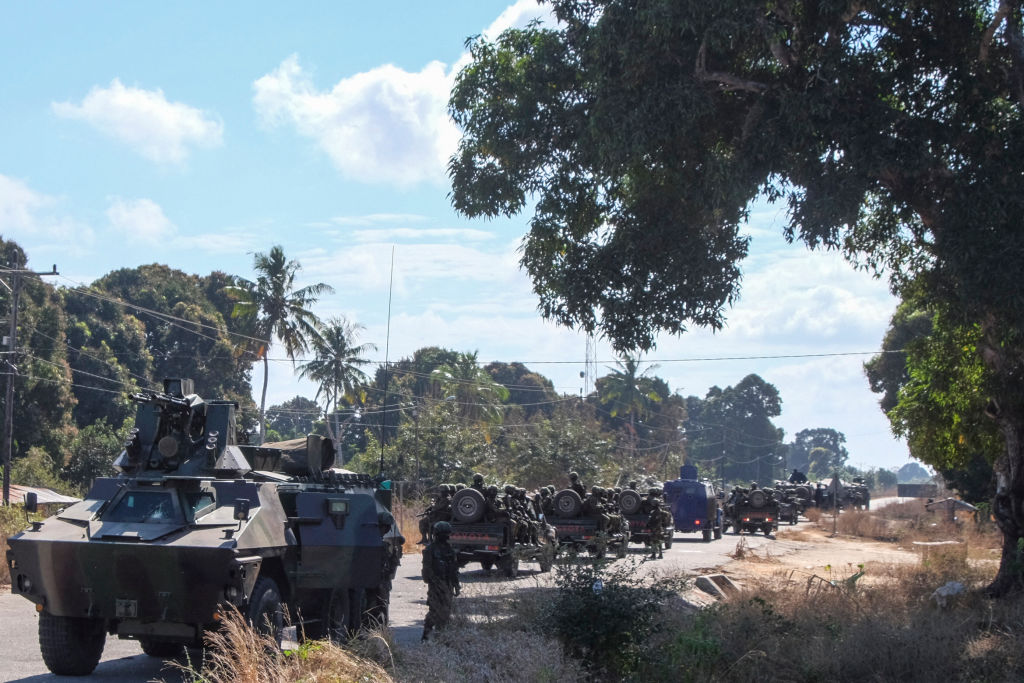ADF STAFF
Northern Mozambique’s Nangade district has been one of the country’s most volatile areas throughout the conflict in the Cabo Delgado province. Only six of the district’s 51 villages have been untouched by violence since fighting erupted about five years ago.
Insurgents in January 2023 kidnapped eight people as they worked in their fields in the village of Chacamba. Seven captives were released, but the eighth was beheaded, the Club of Mozambique newspaper reported.
From February to May, however, the district enjoyed a tenuous calm as troops with the Mozambican Defense and Security Forces (FDS), Southern African Development Community Mission in Mozambique (SAMIM) and international allies made gains against the Ahl al-Sunna wal-Jama’a (ASWJ) extremist group.
In the first 10 months of the year, there were only seven political violence events in Nangade and just four of them were attributed to ASWJ, according to the Armed Conflict Location & Event Data Project.
One of the last confirmed sightings of insurgents was in late March, when fighters were spotted around Namatil, where they surrendered, Mozambique’s Zitamar News reported.
The military successes prompted Mozambican President Filipe Nyusi to state in May that Cabo Delgado’s security situation had returned to normal.
Rwandan President Paul Kagame agreed that great progress was made against terrorists.
“Eighty percent of the insurgency problem has been addressed,” Kagame said in a June report by Bloomberg.
With the insurgents reeling, the Tanzania People’s Defence Force began withdrawing troops from Nangade in November. SAMIM forces began leaving in December with a view to completely withdraw by July 2024.
However, as Zitamar reported, there is evidence that Nangade’s security situation is not yet resolved, and some analysts fear the withdrawal of troops may be premature.
According to an August assessment by ReliefWeb, just a “few” of the district’s 64,880 displaced people have returned home — and most only stay temporarily.
Safety fears were the main reason for the temporary returns, especially regarding the “regular movements of NSAGs [non-state armed groups] in the rural areas,” where residents return to farm and inspect and clean their properties, ReliefWeb reported.
There also have been unconfirmed reports of people-smuggling across the Tanzania border, a common route connecting the insurgency to Burundi, the Democratic Republic of Congo and Tanzania, Zitamar reported.
The withdrawal of SAMIM and TPDF forces will leave counterinsurgency operations to the country’s security forces and a local militia that Mozambique authorized to fight NSWJ in August.
The FDS has not performed well during the insurgency and “often has a poor relationship with communities,” Peter Bofin wrote in a Zitamar report.
The local militia, however, is now well established in Nangade, where it is active in all villages and has a commander based in the district headquarters.
Borges Nhamirre, an Institute for Security Studies consultant, wrote in July that military successes against insurgents throughout Cabo Delgado forced terrorists to change strategies from attacking civilians and security forces to. infiltrating communities to radicalize people and recruit new members.
“To achieve real stability, the root causes of Cabo Delgado’s conflict must be recognized and addressed,”
Nhamirre wrote. “These include, above all, social and economic inequalities in sharing the province’s wealth and better management of its natural resources. The local youth also need hope and opportunity, and the circumstances that lead to radicalization must be prevented.”

